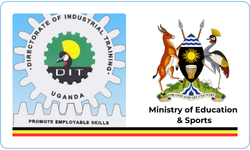Directorate Of Industrial Training

DIRECTORATE OF INDUSTRIAL TRAINING
Ministry Of Education & Sports
" Promote Employable Skills"
- +256 414 259412
- +256 414 251256
- uvqf.dit@gmail.com
Menu
Some of the most important objectives and provisions in the Act are
The ITC is the policy-making organ of the Directorate and an advisory body to the Minister of Education and Sports on BTVET policy matters in the country.
The ITC is composed of two committees;
The Management, Finance and Welfare Committee
The Terms of Reference (TORS) of The Management, Finance and Welfare Committee
- Consider, review and recommend plans and strategies to mobilise funds and human resources for sustainable and efficient operations of the DIT.
- Receive, consider DIT staff performance appraisal reports and recommend to ITC for appropriate action.
- Consider, review and recommend policies and strategies for better management, security, utilization, procurement and disposal of DIT assets and liabilities for approval of the ITC.
- Review and recommend policies and relevant legal provisions that will ensure proper maintenance of the assets register.
- Receive, consider and recommend proposals for the DIT’s planning period and annual estimates of income and expenditure procedures for both recurrent and development activities to the ITC.
- Scrutinize all income and expenditure of the DIT under approved annual estimates through quarterly and annual budget reports and recommend appropriate action to the ITC. In all cases ensure that all Standing Order provisions are adhered to.
- Receive and consider requests for re-allocation of funds in the approved annual estimates and make recommendations to the ITC.
- Confirm all books of Accounts are audited at the close of the Financial Years and Management develops strategies to address audit queries raised by the Internal Auditors and/or Auditor General.
- Consider, review and recommend staff welfare issues (e.g. motivation, staff development, terminal benefits) etc, together with the DIT for better performance and present to the ITC for approval.
- The Committee shall consider any other matters referred to it by the ITC concerning Management, Finance and Welfare issues.
- Recommend any other interventions that promote the growth, development and good standing of DIT.
The Assessment and Standards Committee
The Terms of Reference (TORS) of The Assessment and Standards Committee
- Consider, review and recommend appropriate regulations and guidelines for the production of the Assessment and Training Packages (ATPs), apprenticeship schemes, the issuance of DIT awards for the approval of the ITC.
- Contribute to the advocacy for regular labour market scans leading to strategies for stronger linkages with stakeholders for their sustainable collaboration with support of the Directorate of Industrial Training.
- Provide guidance for occupational research and promotion of on-the job training in industry for apprenticeship, traineeship, indenture training and further skills training or upgrading.
- Consider, review and recommend strategies and policies for the registration and accreditation of BTVET institutions or firms/companies/enterprises as assessment centers and maintain an up-to-date register.
- Consider, review and recommend strategies for registration and accreditation of assessors, facilitators and Test Item Developers.
- Provide guidance, recommend, develop regulations and standards on appropriate and proper conduct of all DIT assessments and schemes and ensure that disadvantaged groups of persons are properly catered for.
- Recommend the phasing out of BTVET examinations conducted by any other examining bodies for approval of the ITC and the Minister.
- Recommend the form of certificates and diplomas to be awarded by DIT and other examination boards established under the BTVET Act, 2008 for approval of the Minister through the ITC to ensure, in addition, recognition of skills acquired from the non-formal, non-public and formal enterprises.
- Review, recommend and set guidelines for management of offences and penalties on DIT assessments, standards and awards.
- Receive and consider quarterly and annual reports to cover assessment and standards performance of the DIT.
- Monitor, evaluate and recommend on the establishment, expansion and application of the UVQF through stronger public-private and other regional/international partnerships.
- Recommend any other interventions that promote the growth, development and good standing of the DIT.
- To develop and recommend policies in respect of the Directorate and its functions to the Minister.
- To approve fees determined by the Directorate under the Act.
- To approve the budget and monitor budgetary performance in the Directorate.
- To prescribe by statutory instrument, rules for the following matters;
- Assessment and Certification systems.
- Accreditation and inspection of assessment centers.
- Promotion of competence based business technical vocational education training (BTVET).
- Apprenticeship training.
- To carry out any other matter related to business technical vocational education training (BTVET).
The key functions of the Directorate are to:
- To identify the needs of the labour market for occupational competencies that fall under the Uganda Vocational Qualification Framework (UVQF).
- To regulate apprenticeship/traineeship/internship schemes.
- To foster and promote entrepreneurial values and skills as an integral part of the UVQF.
- To secure adequate and sustainable financing for the operation of the directorate.
- To accredit training institutions or companies as UVQF assessment centers.
- To assess and award Uganda Vocational Qualifications.
- To develop, apply, expand and improve the purposeful application of UVQF.
- To promote on the job training in industry for apprenticeship, trainee-ship and indenture/agreement training and other training such as further skills training schemes.
- To prescribe the procedure for the making training schemes.


